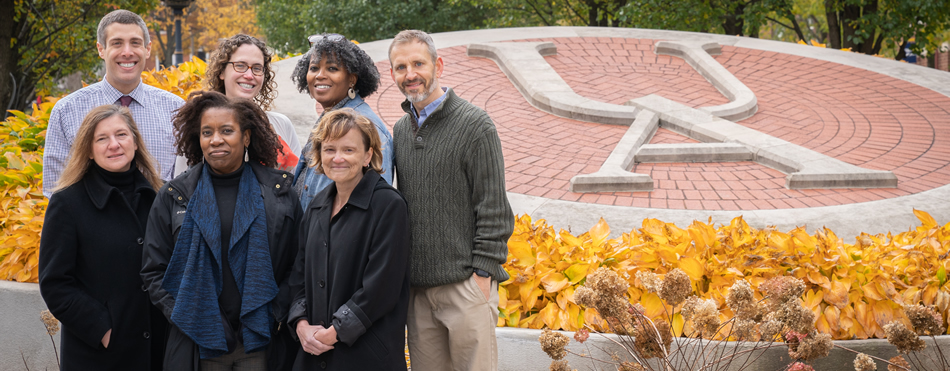Counseling Services
- Video: Overview of the CTC
- Individual Counseling
- Teletherapy
- Group Counseling
- Initial Consultation Session/Getting Started
- Services Outside our Scope of Practice
- Confidentiality
- Fees
- Psychiatric Referral Services
- Career Counseling
Individual Counseling
Through individual counseling services, students meet with a clinician and come up with agreed upon treatment goals. Time-effective empirically supported and culturally responsive interventions are used to help students meet their personal, academic goals, and career goals. Counseling can address a wide range of life circumstances that affect one’s ability to succeed, such as:
- Personal/Wellness issues: Anxiety, depression, loneliness, grief, body image, disordered eating, suicidal thoughts, self-injurious and/or substance use behaviors
- Relationship issues: Partners, roommates, family, colleagues, co-workers, supervisors
- Biopsychosocial and identity-based issues: Adjustment, acculturation, sexual and/or gender identity concerns, disability and neurodiversity
- Academic concerns: Motivation, performance anxiety, perfectionism
- Other issues: Trauma, sexual and intimate partner violence, the impact of oppression on students individual/collective development and their sense of well-being.
Teletherapy
Though most students prefer in-person counseling, students have the option of individual counseling through a live video connection or telephone. Students must be physically located in the state of Ohio during all sessions and enrolled as a student to receive the treatment. You will receive a link via your e-mail for appointments that you will use to access the meeting for the appointment. The CTC videoconferencing programs that are used are free, but do require internet access to link to the video conference. Users must be comfortable with this technology to engage in teletherapy. It’s also important to remember that technology has the potential for breakdowns and interruptions.
Students with concerns that are beyond the scope of service, who may be experiencing acute, ongoing safety concerns, or those for whom videoconferencing impede therapeutic progress are not well suited for teletherapy.
Group Counseling
Group counseling is one of the most effective treatments available for many concerns facing college students. Some of these concerns are:
- Feeling depressed
- Feeling anxious
- Feeling unsupported or alone
- Difficulties with relationships
- Lack of confidence & self-worth
Group counseling provides a safe psychological space where you can share your thoughts, experiences, and emotions with your peers who are struggling with similar issues. It is also an outlet where you can learn and grow from the experiences that others bring into the group. Learn more about group counseling here. A list of group offerings and campus events, such as National Depression Screening Day, can be accessed through our downloadable College Survival Kit.
Initial Consultation Session/Getting Started
The CTC’s free counseling services are provided to currently enrolled UA students through in-person, telephone or videoconferencing sessions that last about 50 minutes.
During the fall and spring semesters, students may see a counselor for a first time intake by coming into the Center. Walk in hours are usually every morning from 9a-11a (except Thursdays) and from 1-3:30p. Students are seen on a first come, first serve basis, so please arrive early.
Students are seen on a first come, first serve basis, so please arrive as early as possible during the walk in time period. If a student is unable to come in for an appointment, they should call the Center for additional intake information.
During the summer, students should call 330-972-7082 or visit the Center at 306 Simmons Hall to schedule an intake appointment. You are asked to arrive to your first visit 30 minutes early in order to complete some background information on a computer.
In your first visit, a clinician will talk with you about presenting concerns and review suitable treatment options. At the end of the session, they will provide recommendations to help you meet your goals. Some students may benefit from longer term or specialized treatment that is not available at the Center. When students require these kinds of services, the clinician will help arrange services with outside providers.
Services Outside our Scope of Practice
Students whose needs fall outside our scope of services or scheduling availability are referred to community resources. The CTC provides referrals after the initial consultation appointment or as soon as any of the factors listed below become apparent during the course of services.
Issues outside of the CTC’s scope of practice that are commonly addressed through referral to services in the community include, but are not limited to:
- Students in need of receiving partial hospitalization services, and/or intensive outpatient services.
- Evidence or risk of progressive deterioration in mental or emotional functioning, requiring intensive psychological/psychiatric care and/or needing specialized interventions.
- An impairing drug and/or alcohol problem, and/or need for detoxification services.
- An impairing eating disorder requiring close medical and/or nutritional monitoring.
- Requests for formal psychological evaluation for the purpose of employment clearance, determining eligibility for vocational rehabilitation or disability benefits.
- Documentation for emotional support or service animals.
- Court-mandated assessment or treatment requirements.
This description of the CTC’s scope of services is intended as a guideline. The nature and complexity of any presenting concern is considered in making the appropriate treatment recommendation(s).
Confidentiality
The CTC takes confidentiality very seriously and will not release your protected behavioral health care information without your written permission. Center records are confidential and not part of or connected in any way to your academic records. If you are under the age of 18, the law may require your parents/guardians to give consent for your treatment. They may also have some access to your treatment records. This law allows for some exceptions; please discuss these with your clinician.
When there are safety concerns for yourself or others, staff clinicians may need to seek help or assistance; in these situations, only the minimum information necessary will be shared with the appropriate persons. Prior to your first meeting with a counselor, you will receive our Informed Consent form and Notice of Privacy Practices. During your first appointment you will have time to discuss any questions or concerns with your clinician.
Fees
There is no charge to eligible students except for fees associated with psychological assessment and nominal fees for career and psychological tests.
Psychiatric Referral Services
In some cases, it may be decided that psychiatric medication could be a helpful complement to counseling. The Center provides referrals to psychiatric providers on campus, such as UA Health Services, and off-campus providers, including the UA Community Psychiatry Program, which is a free service located within a few blocks from the Center.
Career Counseling
Choosing a major and choosing a career are two of the crucial decisions faced by all students. A counselor can help you better understand your interests, goals, values and personality characteristics.
Then, with greater self-understanding and some of the most relevant career theories and instruments, you will be able to explore a variety of majors and occupations that have the potential to lead to a satisfying career.
See also: UA's Career Center
Individual Career Counseling
Career counseling is a process in which a knowledgeable and objective counselor helps an individual identify and understand his/her career issues and provides the necessary tools and support which can lead to good vocational decisions. Psychological inventories, computer guidance programs, as well as books, kits and workshops are useful, but it is an expert counselor who helps assemble this information in order to come to workable solutions about students' career paths.
We recognize that good career decisions do not come easily, and we will work with students to help them make optimal choices.
Career Testing/Assessment
Career testing often helps in the process of deciding on a major or a career, but it does not provide simple, absolute answers. There is no test that will definitively tell you what you should be. Career assessment contributes to a better sense of self-awareness and self-acceptance, two attributes that make career choice much more likely to be successful.
Your counselor will help you identify the most appropriate assessment strategies for your individual situation.
O*NET OnLine
O*NET OnLine is a web-based program that provides details of occupations, such as skills, knowledge, interests, and activities.


 Follow us
Follow us